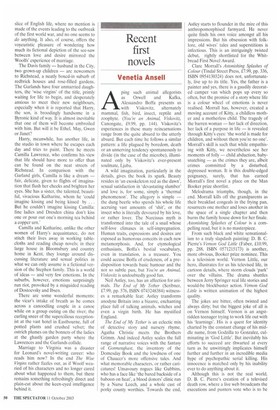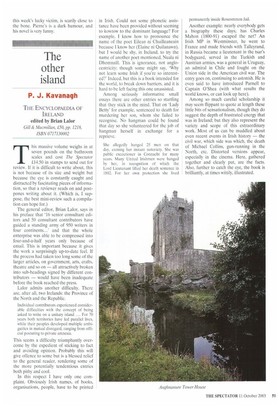Recent first novels
Venetia Ansell
ping such animal allegorists as Orwell and Kafka, Alessandro Boffa presents us with Viskovitz, alternately mammal, fish, bird, insect, reptile and zoophyte. (You're an Animal, Viskovitz, Canongate, £9.99, pp. 144). Viskovitz's experiences in these many reincarnations range from the quite absurd to the utterly absurd. But each time he follows a similar pattern: a life plagued by boredom, death or an unnerving tendency spontaneously to divide (in the case of the microbe), illuminated only by Viskovitz's ever-present soulmate, Ljuba.
A wild imagination, particularly in the details, gives the book its spark. Beauty resides in 'an exoskeleton red as the dawn', sexual satisfaction in 'devastating slumber' and love is, for some, simply a 'thermal phenomenon'. The allegory is simple — the dung beetle who spends his whole life accruing vast amounts of 'shit', or the insect who is literally devoured by his love, or rather lover. The Narcissus myth is transformed into the tale of a snail whose self-love climaxes in self-impregnation. Human traits, expressions and desires are exposed as humorous conceits in each new metamorphosis. And, for etymological enthusiasts, Boffa's bestial vocabulary, even in translation, is a treasure. You could accuse Boffa of crudeness, of a predisposition towards basic humour and the not so subtle pun, but You're an Animal, Viskovitz is undoubtedly good fun.
Neil Astley, too, has an affection for animals. The End of My Tether (Scribner, £7.99, pp. 576, ISBN 0743248384) witnesses a remarkable feat: Astley transforms anodyne Britain into a bizarre, enchanting place full of talking animals, witches and even a virgin birth. He has mystified England.
The End of My Tether is an eclectic mix of detective story and nursery rhyme. Agatha Christie meets the Brothers Grimm. And indeed Astley scales the full range of narrative voices with the fantasy of Gormenghast, the inventory of the Domesday Book and the lewdness of one of Chaucer's more offensive tales. And what memorable characters, or rather caricatures! Unsavoury rogues like Gubbins, who has a face like 'the bared backside of a baboon on heat', a blood donors' clinic run by a Nurse Leech, and a whole cast of porky county worthies. Towards the end, Astley starts to flounder in the mire of this anthropomorphised farmyard. He never quite finds his own voice amongst all his impressions. But his obsession with folklore, old wives' tales and superstitions is infectious. This is an intriguingly twisted debut, rightly shortlisted for the Whitbread First Novel Award.
Clare Morrall's Astonishing Splashes of Colour (Tindal Street Press, £7.99, pp. 336, ISBN 0954130324) does not, unfortunately, live up to its title. Yes, the father is a painter and yes, there is a gaudily decorated camper van which pops up every so often, but the promise of a story where life is a colour wheel of emotions is never realised. Morrall has, however, created a moving account of Kitty, a childless mother and a motherless child. The tragedy of the barren woman — her lack of direction, her lack of a purpose in life — is revealed through Kitty's eyes: 'the world is made for children, and without them you're no one'. Morrall's skill is such that while empathising with Kitty, we nevertheless see her moments of folly — child abduction, babysnatching — as the crimes they are, albeit crimes committed by a disturbed, depressed woman. It is this double-edged poignancy, surely, that has earned Morrall's first novel a place on the Man Booker prize shortlist.
Melodrama triumphs, though, in the end. Morrall kills off the grandparents as their breakfast congeals in the frying pan, resurrects one mother and loses another in the space of a single chapter and then burns the family house down for her finale. Astonishing Splashes of Colour is a compelling read, but it is no masterpiece.
From such black and white sensationalism to a truly slapdash painting: D. B. C. Pierre's Vernon God Little (Faber, £10.99, pp. 288, ISBN 0571215173) is another, more obvious, Booker prize nominee. This is a television world. Vernon Little, our hero, illustrates for us his televised life, in cartoon details, where storm clouds 'park' over the villains. The drama shuttles between Jerry Springer real life stories and would-be blockbuster action. Vernon God Little is written animation of the highest quality.
The jokes are bitter, often twisted and always dirty; but the biggest joke of all is on Vernon himself. Vernon is an angstridden teenager trying to work life out with his learnings'. His is a quest for identity charted by the constant change of his middle name, from Godzilla to Gonzalez, culminating in 'God Little'. But inevitably his efforts to succeed are thwarted at every turn as he unwittingly implicates himself further and further in an incredible media hype of psychopathic serial killing. His innocence is matched only by his inability ever to do anything about it.
Although this is not the real world, D. B. C. Pierre's creation of a televised death row, where a live web broadcasts the executions and punters vote who is to be this week's lucky victim, is scarily close to the bone. Pierre's is a dark humour, and his novel is very funny.



















































































 Previous page
Previous page